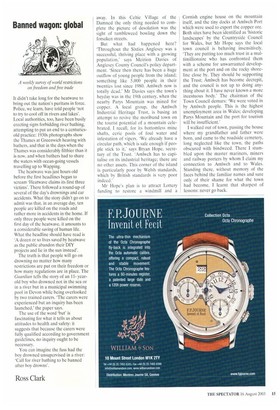Banned wagon: global
A weekly survey of world restrictions on freedom and free trade It didn't take long for the heatwave to bring out the nation's puritans in force. Police, we learn, have told people 'not to try to cool off in rivers and lakes'. Local authorities, too, have been busily erecting signs forbidding river bathing, attempting to put an end to a centuriesold practice: 1930s photographs show the Thames at Greenwich heaving with bathers, and that in the days when the Thames was considerably filthier than it is now, and when bathers had to share the waters with ocean-going vessels travelling up to Wapping.
The heatwave was just hours old before the first headlines began to scream 'Heatwave claims its first three victims'. There followed a round-up of several of the day's drownings and car accidents. What the story didn't go on to admit was that, in an average day, ten people are killed on the roads and rather more in accidents in the home. If only three people were killed on the first day of the heatwave, it amounts to a considerable saving of human life. What the headline should have read is 'A dozen or so lives saved by heatwave as the public abandon their DIY projects and lie in the sun instead'.
The truth is that people will go on drowning no matter how many restrictions are put on their freedom or how many regulations are in place. The Guardian tells the story of an 11yearold boy who drowned not in the sea or in a river but in a municipal swimming pool in Devon while being overlooked by two trained carers. 'The carers were experienced but an inquiry has been launched,' the paper says.
The use of the word 'but' is fascinating for what it tells us about attitudes to health and safety: it suggests that because the carers were fully qualified according to government guidelines, no inquiry ought to be necessary.
You can imagine the fuss had the boy drowned unsupervised in a river: 'Call for river bathing to be banned after boy drowns'.
Ross Clark










































































 Previous page
Previous page